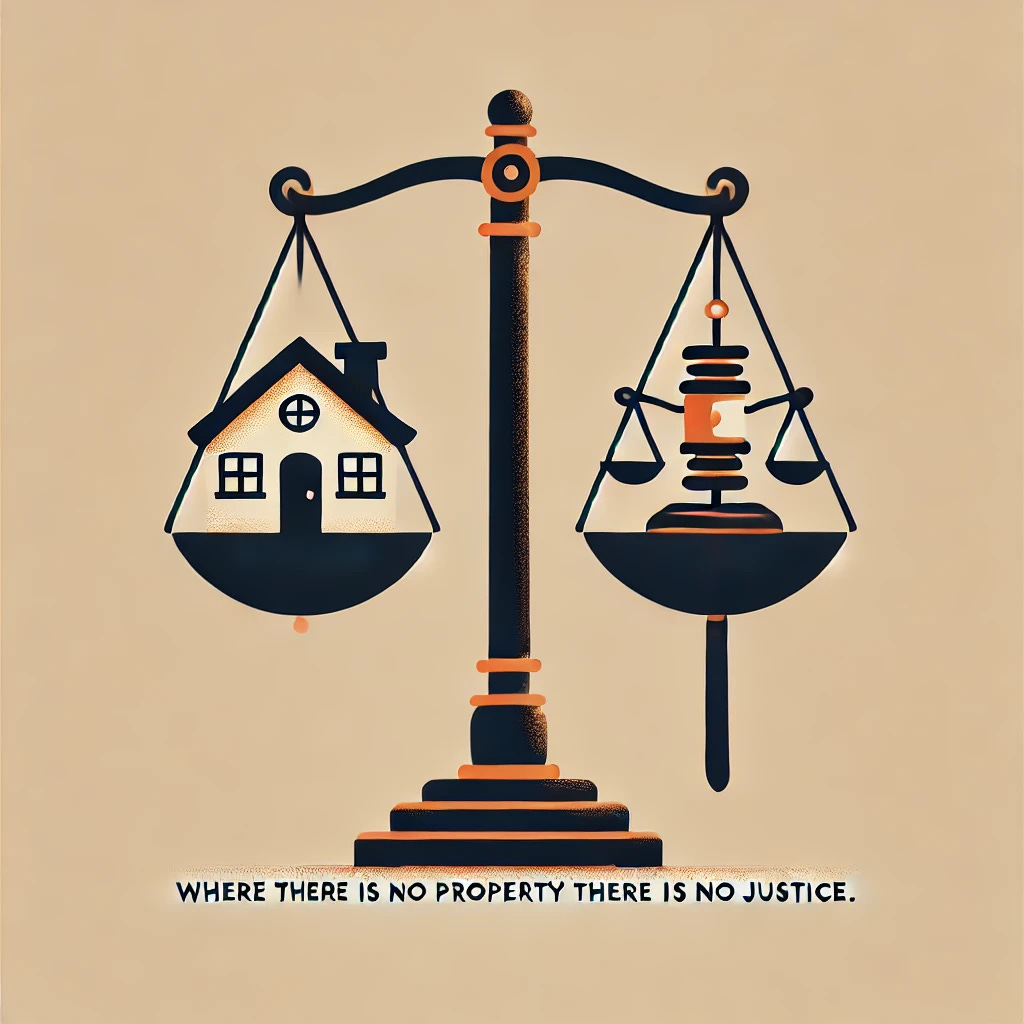Insights from Hayek's The Fatal Conceit: "Where There Is No Property There Is No Justice"(Chapter 2)
The Essential Link Between Property Rights and Justice in Society
In the section titled "Where There Is No Property There Is No Justice" from Friedrich Hayek's The Fatal Conceit, Hayek makes a compelling case for the intrinsic connection between property rights and the concept of justice. He argues that without secure and clearly defined property rights, the notion of justice becomes meaningless, as there would be no stable framework within which individuals could assert their rights or resolve disputes. This section is fundamental to understanding Hayek’s broader defense of private property as a cornerstone of a free and just society.
Why "Where There Is No Property There Is No Justice" Matters
This section is crucial because it highlights the foundational role that property rights play in the structure of a just society. Hayek contends that property rights are not merely a legal convenience but are essential to the very concept of justice. Without property rights, individuals would lack the security and predictability necessary to plan their lives, make long-term investments, or engage in meaningful economic activities. This, in turn, would lead to a breakdown of social order and the erosion of individual freedoms.
Hayek’s argument underscores the importance of protecting property rights as a means of ensuring justice and stability within society. He warns against the dangers of undermining these rights, whether through excessive government intervention, collectivist policies, or the erosion of legal protections. Understanding this concept is key to appreciating Hayek’s critique of socialism and his advocacy for a legal and economic framework that upholds the sanctity of private property.
Key Concepts from "Where There Is No Property There Is No Justice"
Property Rights as the Foundation of Justice: Hayek argues that property rights are the bedrock of justice in any society. Without clear and secure property rights, there can be no consistent or meaningful application of justice.
The Role of Property in Social Stability: Property rights provide the stability and predictability necessary for individuals to plan their lives and engage in economic activities. This stability is crucial for maintaining social order and preventing conflicts.
Justice and the Rule of Law: Hayek emphasizes that justice is closely tied to the rule of law, which depends on the protection of property rights. The legal system must uphold property rights to ensure that justice is applied fairly and consistently.
The Dangers of Undermining Property Rights: Hayek warns that undermining property rights, whether through government expropriation or collectivist policies, leads to the erosion of justice and the breakdown of social order.
Private Property and Individual Freedom: Hayek links private property to individual freedom, arguing that property rights are essential for personal autonomy and the protection of individual liberties.
Detailed Explanation of Each Point
Property Rights as the Foundation of Justice:
Evidence: Hayek argues that property rights are fundamental to the concept of justice because they provide the framework within which individuals can assert their rights and resolve disputes. Without secure property rights, there would be no objective basis for determining what is just or unjust. For example, in societies where property rights are poorly defined or weakly enforced, disputes over resources often lead to violence and social unrest (Hayek 72-73).
The Role of Property in Social Stability:
Evidence: Hayek emphasizes that property rights contribute to social stability by providing individuals with the security they need to plan their lives and make long-term investments. When property rights are respected, individuals can engage in economic activities with confidence, knowing that their assets are protected by law. This stability is crucial for the functioning of markets and the prevention of conflicts over resources (Hayek 73-74).
Justice and the Rule of Law:
Evidence: Hayek links justice to the rule of law, arguing that the protection of property rights is essential for the consistent application of justice. The legal system must uphold property rights to ensure that individuals are treated fairly and that disputes are resolved impartially. Historical examples, such as the collapse of the Soviet Union, illustrate the dangers of a legal system that fails to protect property rights, leading to widespread corruption and injustice (Hayek 74-75).
The Dangers of Undermining Property Rights:
Evidence: Hayek warns that undermining property rights, whether through government expropriation or collectivist policies, threatens the very foundation of justice. When property rights are weakened, individuals lose the security and predictability that are essential for social order. This can lead to social unrest, economic decline, and the erosion of individual freedoms, as seen in various totalitarian regimes throughout history (Hayek 75-76).
Private Property and Individual Freedom:
Evidence: Hayek argues that private property is essential for individual freedom because it provides the material basis for personal autonomy. Property rights allow individuals to control their own resources and make independent decisions about how to use them. Without private property, individuals would be dependent on the state or other collective entities, which would undermine their freedom and personal autonomy (Hayek 76-77).
Conclusion: The Indispensable Role of Property Rights in Justice
In this section of The Fatal Conceit, Hayek articulates the indispensable role that property rights play in ensuring justice and maintaining social order. By understanding the critical link between property and justice, we can better appreciate the importance of protecting property rights as a means of upholding individual freedom and societal stability. Hayek’s insights challenge us to defend property rights against threats from collectivist ideologies and to recognize that where there is no property, there can be no justice.




